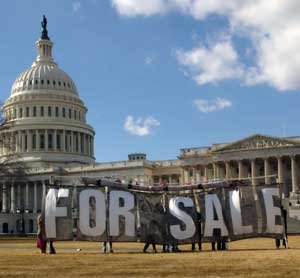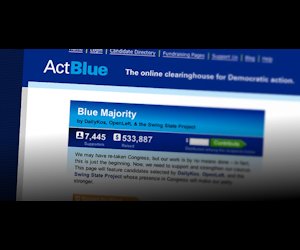How Did Fundraising Affect the Senate in 2012?
 | | This is pretty much how we see it |
One thing most regular people can seem to agree on, regardless of political pursuasion, is the idea that our politicians are bought and sold. Whether it's called corporate welfare, crony capitalism, or just flat-out corruption, there is a genuine and pervasive belief out there that vast swaths of money are being thrown at politicians in order to ensure that they do what big businesses want rather than what is best for the country. There is currently a movement--being pushed even by the current Senate majority leader--to pass a Constitutional amendment that would purport to get money out of politics. With teams of lobbyists, bureaucrats, union reps, and corporate shills flooding Capitol Hill on a daily basis, it's hard to refute the notion that our government--on both the left and the right--has become irreparably tied to the incentives and desires of the rich rather than the everyman.
The grandfather of free market capitalism himself, Adam Smith, was wary of the influence of incorporated interests. He warned in his seminal work, The Wealth of Nations, that "people of the same trade seldom meet together, even for merriment and diversion, but the conversation ends in a conspiracy against the public." Over the years, this nation has grown ever more skeptical of businesses, corporations, and unions, especially as it relates to how they interface with our political leaders. A business, after all, has every incentive to seek an unfair advantage over the competition, and no doubt the safest advantage is one enshrined in statutory law. It should come as no surprise that billions of dollars are thrown around Washington, that incomprehensible amounts of money are given to candidates who are friendly to one particular corporation or labor union at the expense of others.
My concern today is not with the reality of this inherent problem in our system of governance (after all, I believe attempting to fix it would do far too much violence to our way of life, to our economic prosperity, and to our freedoms of speech and assembly). Rather, I'm interested in whether or not throwing money at political candidates is a wise investment, whether it is in fact true that the candidate who gets and spends the most money on the campaign trail is guaranteed to win. Can you, with any degree of certainty, buy a candidate?
 | | ActBlue: the largest single campaign contributor by far, according to OpenSecrets.org |
In order to answer this question, I decided to look at the most recent national election cycle in 2012. I don't want to focus on the presidency--as a sample size of one is hardly illustrative of a pattern--though, if you're interested, the Obama campaign received much more money than the Romney campaign ($722.4 million to $447.6 million, according to the Federal Election Commission), and as hopefully you know, the president was re-elected by a significant margin. I also don't want to spend much time on the House of Representatives, for two reasons: (1) gerrymandering and other confounding factors make the House problematic; and (2) that's a lot of numbers to crunch. So, instead, I'm sticking to the Senate elections, where it is relatively simple to compare vote tallies to campaign receipts.
In a general sense, the Senate races were a boost for Democrats and a loss for Republicans, with a net of two seats changing hands between the parties (though only one seat changed directly from Republican to Democrat, because the Republicans lost one seat to an independent candidate and one seat previously held by an independent was won by the Democrats). Interestingly, the Republicans did poorly despite outspending the Democrats by about $4 million. It was far more dramatic over in the House, where the Democrats were outspent by over $100 million but still managed to take nine seats from the Republicans. In other words, the 2012 elections were considered a substantial loss for the GOP, even though it outraised and outspent the Democrats in Congress.
Things get more interesting when you look at the individual races. In total, there were 33 Senate seats up for grabs. Of these, the Democrats won 23, the Republicans 8, and 2 were won by independents. Looking at the FEC's numbers for total campaign receipts for the period between January 1, 2011 and December 31, 2012, it definitely appears at first glance that the candidate with the most money usually won, as was the case in at least two-thirds of the races. Three races involved a major Democratic candidate not disclosing his finances (Tim Chesnut, Mark Clayton, and Al Gore, Jr.), so it is impossible to know how those races compare.
 | | The "evil" Koch Brothers, whose Koch Industries is the fifty-eighth largest single campaign contributor, according to OpenSecrets.org |
There is a sticking point, though, when you consider the element of incumbency. It is a well-understood general rule that an incumbent has a big advantage over a newcomer, for a number of reasons. One of those reasons is money. An incumbent doesn't always have to compete in a primary election (which is why President Obama was able to outspend Mitt Romney by such a wide margin), and an incumbent has a pre-existing structure around which campaign funds can be collected. There are many other reasons, too, so perhaps, for my purposes, it would be wise to look at how incumbency affected the 2012 Senate races.
21 of the 33 races involved an incumbent, and the incumbent only lost in one of those races (Scott Brown lost to Elizabeth Warren in Massachusetts). There were only three elections (as long as you ignore the three races with undisclosed funds, all of which involved an incumbent) in which the incumbent was outspent by his or her challenger--including in the case of Scott Brown and Elizabeth Warren--which ultimately means that, in at least two cases, the incumbent still managed to win despite being outspent. The 15 other races all involved an incumbent who not only raised more money but also won re-election.
But what of the other 12 seats, the ones that didn't have an incumbent? Here's where it gets precisely unpredictable: the richest campaign won in six races and lost in six races, a fifty-fifty split. In Senate races that didn't have the benefit of incumbency, it is essentially a coin-flip when it comes to predicting whether the size of a candidate's fundraising wallet was a good indicator of his or her popularity.
 | | Yes, those war-on-women-waging Republicans gave over $50 million to a woman, and yes, she is married to Vince |
There are two elections that are the most startling: Connecticut and Pennsylvania. In Connecticut, Republican candidate Linda McMahon outraised Democrat Chris Murphy five-to-one (more specifically, $50,963,418 to $10,543,456), and in Pennsylvania, Republican Tom Smith outraised Democratic incumbent Bob Casey, Jr., by over three-to-one ($37,774,108 to $11,157,095). Granted, Pennsylvania involved an incumbent, so it's easy to see how other factors contributed to Casey's 9.1% victory. However, in Connecticut, Linda McMahon lost by a whopping 11.7% despite the enormous financial advantage, and she wasn't even going up against an incumbent. In the end, voters simply didn't find her as compelling as Chris Murphy, campaign contributions be damned.
This leads me to conclude that buying elections is hardly a sure bet. We haven't become so corrupt as a nation that the voter doesn't still have the final word. Having said that, of course big businesses, corporations, and unions have other ways of peddling their influence--primarily through lobbying--and sure, by the time a candidate is up for election, he or she has probably already made shady promises to big donors. Still, the idea that our lawmakers are selected by Wall Street instead of Main Street is just too simplistic and cynical to be true. I'm quite relieved to discover that this is the case, at least for now.
-e. magill 8/6/2014
|
|